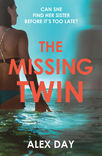The inspiration behind The Missing Twin
- Admin
- Nov 19, 2017
- 4 min read

My debut psychological thriller The Missing Twin was inspired by my experiences teaching in a secondary school in north London where many of the students were asylum seekers or refugees. Below, I write about the profound effect meeting these children had on me.
It's a wet Wednesday in Wembley and the class is subdued - period 1, and they haven't quite woken up yet. Thirty girls, mostly from Iraq, Iran and Afghanistan, but also Pakistan, Bangladesh, Somalia and Sri Lanka, all studying conflict poetry in preparation for their GCSE exams. We're working on a poem called The Yellow Palm. Each stanza begins with the same refrain about Palestine Street in Baghdad. Immediately, hands go up. The class seems to collectively stir and come alive. Here is something they know. Here is something they can relate to.
'My mum grew up on Palestine Street,' says one.
'My dad lived there,' countered another. And then she pauses. 'But that was before Saddam Hussein imprisoned him for his political views.' Another pause, longer this time. 'He was tortured daily for five years. I think that's why he can't work, because of the damage done to his body, and his mind.'
How do you go back to English literature after that?
And then, at parents' evening, a Syrian dad and his daughter, Reem, with no more than a dozen words of English between them, tries to communicate what they have been through. An 11-year old from the Lebanon translates the Arabic.
'We lost everything,' he says. 'Bombs, explosions, sniper fire. Everything was destroyed, nothing left.'
'What about your family?'
It feels wrong to ask, and wrong not to.
Is it better to question too much and risk offending or better not to question at all and risk looking callous and uncaring? In the end, I ask because I want to know, because it might help me to understand his daughter, who sits in my classroom rocking backwards and forwards and singing softly to herself under her breath. Except for the Arabic songs, she is silent, wordless. She has learnt 'toilet' and that's about it. I have placed her next to kind girls because I've heard she's being bullied. Waiting to enter the classroom one day, I hear one of the kind girls complimenting her.
‘Nice headscarf, Reem,’ she says.
It breaks my heart. Reem doesn’t understand the words but I hope she understands the meaning and the sentiment behind them. The other students don't know how to get through to her any more than I do, but they kind ones are trying their best, just like I am.
In the echoey, chilly school hall, the father spreads his hands in the universal gesture that signifies hopelessness. 'Gone,' he says. 'All gone.'
I'm not sure if that means it's only him and his daughter left or if there is still a mother, siblings, alive and he’s referring to the extended family. At this point, though, I know I mustn’t go further. He has tears in his eyes and he's clearly having trouble holding it together. I want to comfort him but of course I can't, or at least I can't in any way but with utterly inadequate words.
'I'm so sorry,' I mutter.
'Now I just want Reem to get an education,' he says, insistently. 'So she can start again.'
I don't know how easy it will be for either of them to start again. But they have come to parents' evening even when they know no one and don’t speak the language, which seems a brave and hopeful act.
It momentarily brightens Wembley in the wintertime.
Months later, back in the summer of 2015, the plight of the millions of Syrians caught up in their country’s brutal civil war really started to hit the headlines. Every day was another story of desperate flight, peril on the high seas, tragic deaths of the young and old. But for most us in the UK, our lives continued just as they always had. Other than read the reports and donate money to aid organisations, there wasn’t an awful lot any of us could do. And I, like many, carried on with my normal everyday routines, the conflict and its consequences only taking centre stage in my thoughts every now and again.
Then one day, reading again about Britain’s paltry response to helping and taking in refugees, I thought of Reem and all the other children, Syrian or otherwise, who had found themselves in the school I had taught in, having somehow got to the UK and what they hoped would be sanctuary.
I started to think that I wanted to write a story that would show how the most unlikely people have a connection, and how even those who are totally wrapped up in themselves – like my character Edie – can find inner strength and resourcefulness they never knew they had when someone’s life – like my character Fatima’s – hangs in the balance. I wanted also to show how frequently women fall prey to men’s sexual violence, whether in times of war or in a supposedly consensual, but actually exploitative, relationship. How prescient that seems now, with all of the sexual scandals currently being revealed.
However, the most important thing of all is that I wanted to write a story that wouldn’t be moralistic and sanctimonious, but fast-moving and gripping. That would be tense and uneasy, with an ultimate twist that would hopefully come as a surprise to readers.
If you enjoy reading The Missing Twin, the best way to tell me is write a review on Amazon. And you can follow me on Twitter @alexdaywriter or visit my website www.alexdaywriter.co.uk



Comments